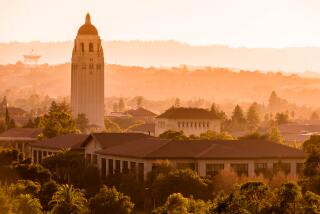Pacific Shift : by William Irwin Thompson (Sierra Club: $15.95; 208 pp., illustrated)
- Share via
In this book of four essays, William Irwin Thompson is at his best when he contrasts industrial civilization (Europe and America, circa 1880-1960) with its post-industrial successor.
He argues that at present we are moving on a global scale from print to electronics, from Greek abstractions to Neo-Egyptian hieroglyphic thinking (via computer graphics?), from routinization achieved by commerce to rationalization achieved by “planet management,” from Homo faber to Homo ludens, from rapid change to steady state, and (most provocative) from natural living to biomedical processing.
None of this is original. Is some of it at least fresh?
No. William Irwin Thompson is a stale oracle and a poor man’s Marshall McLuhan. Decrying the present loss of nerve among European intellectuals, he declares: “Small wonder that feminists and Zen monks, rock stars and computer hackers, citizen activists and artistic entrepreneurs have hijacked Europe and taken it to California.” How silly.
Then there is the author’s remarkable confession that “all scholarship is disguised autobiography.”
All scholarship? If Thompson used this phrase when he originally presented these essays as lectures at the University of Hawaii, then the assembled scholars should have walked out of the room, or, better yet, just burst out laughing. Is the man serious?
There is more trouble, and worse. The author is determined to fit his speculations about the future into an unsuitable geographic grid: The Pacific Shift.
At first blush, Thompson’s central thesis appears to be straightforward: The day of Atlantic civilization is done, and the Pacific era is now dawning.
Beware. The arrival of such a culture is better understood as a universal phenomenon in which geography is not the determining factor. Thompson’s “Pacific-mindedness” is his undoing.
An example: The author places great stress on what he calls the “four cultural ecologies of the West,” which are in chronological order the Riverine (e.g., ancient Egypt), the Mediterranean, the Atlantic and the Pacific-Space (as in outer space).
Space? How is space exploration linked with the Pacific? America’s great rival in the outer ether is Eurocentric and Atlantic-focused Russia. The most exciting pictures of Halley’s Comet were taken by the European space probe “Giotto.”
Japan’s space program is paltry by comparison. Closer to home, I do not see how the American space effort can in any useful way be described as “Atlantic” or “Pacific” in the sense Thompson uses these terms.
Now if the idea of a Pacific Century has any meaning at all, it must refer to the contemporary cultural impact of California and the economic dynamism of East Asia, particularly Japan. But it is not obvious that the author of “Pacific Shift” is particularly interested in or informed about either.
What counts for Thompson is the idea of a “Pacific Orientation,” which is a kind of post-Cartesian, post-nation-state romantic pastoralism. “Pacific” here is simply a buzz word for the new. An unnecessary word, and scarcely a necessary book.
More to Read
Sign up for our Book Club newsletter
Get the latest news, events and more from the Los Angeles Times Book Club, and help us get L.A. reading and talking.
You may occasionally receive promotional content from the Los Angeles Times.










